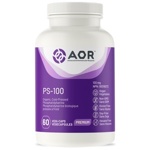|
|||||||
|
|
|||||||
Cognitive support
Stress
Sports nutrition
SunPS® Phosphatidylserine (certified organic, cold pressed sunflower) 100 mg
Phosphatidylserine (PS) is a phospholipid that is a structural component of cell membranes throughout the body, but is most concentrated in the brain and cerebral cortex. Additionally, there is evidence that phosphatidylserine can significantly reduce levels of the hormone cortisol, which is released by the body in response to stress. Research has focused on the connection between lower cortisol levels and elevated mood. It can also support athletes and those under stress by reducing cortisol levels. Memory, learning, concentration and overall cognitive stamina can be improved by its use.
60 or 120 Capsules
Take one capsule three times daily with/without food
Disclaimer: This content is subject to change. The information is intended to inform and educate; it does not replace the medical evaluation, advice, diagnosis or treatment by a healthcare professional. www.nhpassist.com © 2014 NDAssist Inc. and/or its affiliates. All rights reserved.

|
PS-100
Indications
Warning (2)
: Trying to access array offset on value of type null [in /home/ndassist/nhpassist.com/templates/Products/index.php, line 2776]
Code
/home/ndassist/nhpassist.com/vendor/cakephp/cakephp/src/View/View.php /home/ndassist/nhpassist.com/vendor/cakephp/cakephp/src/View/View.php, line 1222 Cake\View\View->_evaluate() /home/ndassist/nhpassist.com/vendor/cakephp/cakephp/src/View/View.php, line 1179 Cake\View\View->_render() /home/ndassist/nhpassist.com/vendor/cakephp/cakephp/src/View/View.php, line 810 Cake\View\View->render() /home/ndassist/nhpassist.com/vendor/cakephp/cakephp/src/Controller/Controller.php, line 790 Cake\Controller\Controller->render() /home/ndassist/nhpassist.com/vendor/cakephp/cakephp/src/Controller/Controller.php, line 569 Cake\Controller\Controller->invokeAction() /home/ndassist/nhpassist.com/vendor/cakephp/cakephp/src/Controller/ControllerFactory.php, line 140 Cake\Controller\ControllerFactory->handle() /home/ndassist/nhpassist.com/vendor/cakephp/cakephp/src/Controller/ControllerFactory.php, line 115 Cake\Controller\ControllerFactory->invoke() /home/ndassist/nhpassist.com/vendor/cakephp/cakephp/src/Http/BaseApplication.php, line 325 Cake\Http\BaseApplication->handle() /home/ndassist/nhpassist.com/vendor/cakephp/cakephp/src/Http/Runner.php, line 86 Cake\Http\Runner->handle() /home/ndassist/nhpassist.com/vendor/cakephp/cakephp/src/Http/Runner.php, line 86 Cake\Http\Runner->handle() /home/ndassist/nhpassist.com/vendor/cakephp/cakephp/src/Http/Middleware/CsrfProtectionMiddleware.php, line 166 Cake\Http\Middleware\CsrfProtectionMiddleware->process() /home/ndassist/nhpassist.com/vendor/cakephp/cakephp/src/Http/Runner.php, line 82 Cake\Http\Runner->handle() /home/ndassist/nhpassist.com/vendor/cakephp/cakephp/src/Http/Runner.php, line 67 Cake\Http\Runner->run() /home/ndassist/nhpassist.com/vendor/cakephp/cakephp/src/Routing/Middleware/RoutingMiddleware.php, line 198 Cake\Routing\Middleware\RoutingMiddleware->process() /home/ndassist/nhpassist.com/vendor/cakephp/cakephp/src/Http/Runner.php, line 82 Cake\Http\Runner->handle() /home/ndassist/nhpassist.com/vendor/cakephp/cakephp/src/Routing/Middleware/AssetMiddleware.php, line 68 Cake\Routing\Middleware\AssetMiddleware->process() /home/ndassist/nhpassist.com/vendor/cakephp/cakephp/src/Http/Runner.php, line 82 Cake\Http\Runner->handle() /home/ndassist/nhpassist.com/vendor/cakephp/cakephp/src/Http/Middleware/EncryptedCookieMiddleware.php, line 93 Cake\Http\Middleware\EncryptedCookieMiddleware->process() /home/ndassist/nhpassist.com/vendor/cakephp/cakephp/src/Http/Runner.php, line 82 Cake\Http\Runner->handle() /home/ndassist/nhpassist.com/vendor/cakephp/cakephp/src/Error/Middleware/ErrorHandlerMiddleware.php, line 149 Cake\Error\Middleware\ErrorHandlerMiddleware->process() /home/ndassist/nhpassist.com/vendor/cakephp/cakephp/src/Http/Runner.php, line 82 Cake\Http\Runner->handle() /home/ndassist/nhpassist.com/vendor/cakephp/cakephp/src/Http/Runner.php, line 67 Cake\Http\Runner->run() /home/ndassist/nhpassist.com/vendor/cakephp/cakephp/src/Http/Server.php, line 99 Cake\Http\Server->run() /home/ndassist/nhpassist.com/webroot/index.php, line 40 [main] Cognitive support IngredientsSunPS® Phosphatidylserine (certified organic, cold pressed sunflower) 100 mg Quantity
Warning (2)
: Trying to access array offset on value of type null [in /home/ndassist/nhpassist.com/templates/Products/index.php, line 2807]
Code
/home/ndassist/nhpassist.com/vendor/cakephp/cakephp/src/View/View.php /home/ndassist/nhpassist.com/vendor/cakephp/cakephp/src/View/View.php, line 1222 Cake\View\View->_evaluate() /home/ndassist/nhpassist.com/vendor/cakephp/cakephp/src/View/View.php, line 1179 Cake\View\View->_render() /home/ndassist/nhpassist.com/vendor/cakephp/cakephp/src/View/View.php, line 810 Cake\View\View->render() /home/ndassist/nhpassist.com/vendor/cakephp/cakephp/src/Controller/Controller.php, line 790 Cake\Controller\Controller->render() /home/ndassist/nhpassist.com/vendor/cakephp/cakephp/src/Controller/Controller.php, line 569 Cake\Controller\Controller->invokeAction() /home/ndassist/nhpassist.com/vendor/cakephp/cakephp/src/Controller/ControllerFactory.php, line 140 Cake\Controller\ControllerFactory->handle() /home/ndassist/nhpassist.com/vendor/cakephp/cakephp/src/Controller/ControllerFactory.php, line 115 Cake\Controller\ControllerFactory->invoke() /home/ndassist/nhpassist.com/vendor/cakephp/cakephp/src/Http/BaseApplication.php, line 325 Cake\Http\BaseApplication->handle() /home/ndassist/nhpassist.com/vendor/cakephp/cakephp/src/Http/Runner.php, line 86 Cake\Http\Runner->handle() /home/ndassist/nhpassist.com/vendor/cakephp/cakephp/src/Http/Runner.php, line 86 Cake\Http\Runner->handle() /home/ndassist/nhpassist.com/vendor/cakephp/cakephp/src/Http/Middleware/CsrfProtectionMiddleware.php, line 166 Cake\Http\Middleware\CsrfProtectionMiddleware->process() /home/ndassist/nhpassist.com/vendor/cakephp/cakephp/src/Http/Runner.php, line 82 Cake\Http\Runner->handle() /home/ndassist/nhpassist.com/vendor/cakephp/cakephp/src/Http/Runner.php, line 67 Cake\Http\Runner->run() /home/ndassist/nhpassist.com/vendor/cakephp/cakephp/src/Routing/Middleware/RoutingMiddleware.php, line 198 Cake\Routing\Middleware\RoutingMiddleware->process() /home/ndassist/nhpassist.com/vendor/cakephp/cakephp/src/Http/Runner.php, line 82 Cake\Http\Runner->handle() /home/ndassist/nhpassist.com/vendor/cakephp/cakephp/src/Routing/Middleware/AssetMiddleware.php, line 68 Cake\Routing\Middleware\AssetMiddleware->process() /home/ndassist/nhpassist.com/vendor/cakephp/cakephp/src/Http/Runner.php, line 82 Cake\Http\Runner->handle() /home/ndassist/nhpassist.com/vendor/cakephp/cakephp/src/Http/Middleware/EncryptedCookieMiddleware.php, line 93 Cake\Http\Middleware\EncryptedCookieMiddleware->process() /home/ndassist/nhpassist.com/vendor/cakephp/cakephp/src/Http/Runner.php, line 82 Cake\Http\Runner->handle() /home/ndassist/nhpassist.com/vendor/cakephp/cakephp/src/Error/Middleware/ErrorHandlerMiddleware.php, line 149 Cake\Error\Middleware\ErrorHandlerMiddleware->process() /home/ndassist/nhpassist.com/vendor/cakephp/cakephp/src/Http/Runner.php, line 82 Cake\Http\Runner->handle() /home/ndassist/nhpassist.com/vendor/cakephp/cakephp/src/Http/Runner.php, line 67 Cake\Http\Runner->run() /home/ndassist/nhpassist.com/vendor/cakephp/cakephp/src/Http/Server.php, line 99 Cake\Http\Server->run() /home/ndassist/nhpassist.com/webroot/index.php, line 40 [main] DoseTake one capsule three times daily with/without food |
|---|